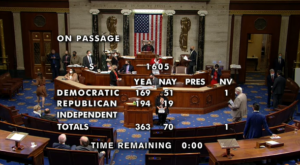The House on Tuesday evening passed the compromise final version of the fiscal year 2022 National Defense Authorization Act (NDAA), with the annual defense policy bill receiving more votes in favor from Republicans than Democrats.
The Democratic-led House voted 363-70 to pass the NDAA, with 194 Republicans and 169 Democrats moving to approve the bill, as several members of the majority party voiced concern over measures removed from the final legislation.

“This bill represents compromise between both parties and chambers – as a result, every single member involved has something in it they like and something that didn’t get into the bill that they wish had. This year’s procedural realities made the entire process exponentially more difficult. When we get to the end of this arduous process, we often forget the hundreds of provisions we came to agreement on and focus solely on where we could not come to agreement. Ultimately, our responsibility as a Congress to provide for the common defense supersedes these areas of disagreement, making the substance of this bill and its signature into law critical,” Rep. Adam Smith (D-Wash.), chair of the House Armed Services Committee, said in a statement following the vote.
In total, 51 Democrats and 19 Republicans voted against the $768.2 billion NDAA.
The final version of the NDAA, which was rolled out earlier on Tuesday, is a compromise version negotiated between the leaders of the House and Senate Armed Services Committee in an informal conference after the Senate’s version of the bill stalled out on the floor over disagreements on amendments (Defense Daily, Dec. 7).
The NDAA endorses a $25 billion boost to the defense topline, authorizes the Biden administration’s request to procure 85 F-35s, calls for more funds to procure additional F-15EXs, F/A-18E/F Super Hornets and CH-47F Block II Chinooks and adds $4.7 billion to cover five additional ships to the Navy’s shipbuilding plan.
Ahead of Tuesday evening’s vote, Democratic lawmakers and HASC members such as Reps. Anthony Brown (D-Md.) and Donald Norcross (D-N.J.) noted concerns over the bills lack of provisions to address racial bias and extremism issues and its dropping of new “Buy American” provisions, respectively.
Brown voted against the bill while Norcross ultimately voted in favor.
Reps. Ro Khanna (D-Calif.), Tom Malinowski (D-N.J.) and Gerry Connolly (D-Va.) all voted against the bill and released a joint statement detailing their opposition the bill’s lack of provisions addressing the U.S.’ relationship with Saudi Arabia over human rights concerns and Riyadh’s involvement in the war in Yemen.
“While we back many critical measures in the National Defense Authorization Act that support our troops and military readiness, we could not vote for the final bill today. The House-passed National Defense Authorization Act, which garnered strong bipartisan support, included numerous provisions to advance the fight against autocracy and corruption around the world, including provisions to rebalance our relationship with Saudi Arabia in the face of the Kingdom’s disastrous war in Yemen and its campaign of reaching into other countries to threaten and kill its critics,” the three lawmakers wrote in a joint statement, attributing the blocking of Saudi Arabia-related measures to opposition from “a small group of senators.”
The Senate is expected to take up the NDAA on the floor before the end of the week.